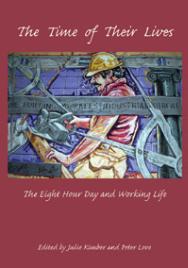CQ historian puts IR debate in historical context
Published on 09 October, 2007

Dr Barbara Webster has contributed to a book on the early labour movement in Australia.In the lead up to the Federal election when industrial relations is the key debate, the city of Rockhampton has featured in a timely, new historical book that looks at the early labour movement in Australia.
Central Queensland University historian Dr Barbara Webster contributed a chapter on Rockhampton's early Labour Day organisation and celebrations in the recently launched book The Time of their Lives: The Eight Hour Day and Working Life.
The chapter titled Celebrating the "Great Boon": Eight Hour Day and early Labour Day in Rockhampton, 1909 - 1929 follows the life of the Labour Day organising committee, its triumphs and trials, until it collapsed in 1929 due to increasing financial difficulties from the Depression and inter-union ideological conflict.
The chapter also explores the celebratory activity of Eight Hour Day/Labour Day and how the day could be interpreted by historians as a form of working-class ‘performance'.
"In the late 19th and early 20th centuries, the Eight Hour principle was espoused by unions for eight hours work, eight hours rest and eight hours recreation. At the time, people regularly worked 10 hour days, often for 6 days a week, not to mention low wages and appalling physical working conditions," Dr Webster explained.
"In the early years, Labour Day was also meant to send a message to employers for the need for better hours, wages and conditions and then became a demonstration of union achievement and strength as better terms were won for workers."

The Time of their Lives: The Eight Hour Day and Working Life is available at the CQU Library.Dr Webster said the book largely demonstrates in an historical context that in an economy where profit is paramount, workers without unions are vulnerable to exploitation by employers.
"The book is sure to give food for thought."
"The subjects of Eight Hour/Labour Day and working life are important to me because they are part of the great history of struggle for fairness by working people.
"Labour history (not to be confused with Labor history) is also full of colourful personalities and events that make historical research so interesting. And, as a local historian, I like to explore working lives in my own community of Rockhampton."
Dr Webster said she was originally asked to present a paper on the topic at the 150th anniversary of the first Eight Hour day and was later asked to contribute to the book.
The book, edited by Julie Kimber and Peter Love, was launched at the 2007 Labour History Conference in Melbourne in early July.
Costing $24 (including postage) the book can be purchased online from the Australian Society for the Study of Labour History and is also available at the CQU Library.

